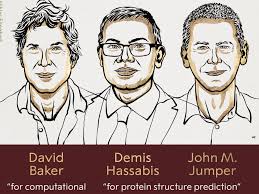2024 Nobel Prize in Chemistry

- 09 Oct 2024
In News:
U.S. Scientists David Baker and John Jumper and Britain’s Demis Hassabis won the 2024 Nobel Prize in Chemistry, for their work on understanding the protein structures.
Prize Distribution
- David Baker: Awarded half of the Prize for pioneering work in computational protein design.
- Demis Hassabis and John Jumper: Jointly awarded the other half for their revolutionary contributions to protein structure prediction using artificial intelligence.
Significance of Achievements
- The advancements in protein science represent a major milestone for healthcare and biotechnology.
- These innovations have unlocked new possibilities for designing proteins, potentially leading to breakthroughs in medicine, agriculture, and more.
David Baker's Innovations
- Baker has achieved the significant feat of creating entirely new types of proteins, enhancing our understanding of protein functionality.
- In 2003, he designed a novel protein using amino acids and custom software methods, which opened avenues for rapid protein creation.
- Applications include pharmaceuticals, vaccines, nanomaterials, and tiny sensors.
AI Contributions by Hassabis and Jumper
- Demis Hassabis and John Jumper employed advanced artificial intelligence to address the challenge of predicting complex protein structures.
- In 2020, they introduced the AI model AlphaFold2, which can predict the structure of nearly all identified proteins (approximately 200 million).
Notable Facts about the Nobel Prize in Chemistry
- The Nobel Prize in Chemistry has been awarded 116 times to 197 laureates from 1901 to 2024.
- Frederick Sanger and Barry Sharpless are the only recipients to have won the Prize twice.
- The inaugural Prize was awarded in 1901 to Jacobus H. van ‘t Hoff for his work on chemical dynamics and osmotic pressure.
- Marie Curie became the first woman to win the Prize in 1911 for her discovery of radium and polonium.
- Venkatraman Ramakrishnan, a citizen of Indian origin, received the Prize in 2009 for his research on ribosomes.
